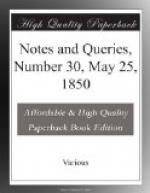The following notes from this chronicle may not be without interest, as showing an early connection between the abbey and this country, and our attachment to the See of Rome.
Chapter V. is devoted to the praise of BAGGA, a monk and presbyter of this abbey, who is said to have been “ex Britannia Oceani insula Saxonico ex genere ortus.” He died, and was buried in the abbey, between the years 707 and 723; on which occasion the Abbot Benignus is said to have exclaimed, “O signifer fortissime Christi militiae BAGGA, nunc mercedem laborum laetus accipis tuorum. Deprecare ipsum benignum Dominum, ut una tecum mereamur gaudere consortiis justorum per aevum.” Here is a prayer not for, but to the dead.
During the presidency of AUSTRULPHUS (ch. 13.), which began in 747 and ended in 753, a certain receptacle, in the form of a small pharos, was driven ashore in the district of Coriovallum, which contained a very fair copy of the four Gospels, beautifully written in Roman characters on the purest vellum; and part of the precious jaw of St. George the Martyr, as well as a portion of the “health-bearing” wood of the true cross, duly labelled. The acquisition of this treasure was of course ascribed to the immediate interposition of God. And as about the same period the head of St. George was discovered at Rome, through the intervention of Pope Zachary, it was conjectured that this pontiff had given the wonder-working relic to some venerable men from Britain, a country described as being “always on the most intimate footing (maxime familiares) with the Apostolic See;” and that, these being wrecked on their voyage home, or through some other adventure, the said treasure was providentially driven ashore at Coriovallum.
Chapter XV. gives us an account of GERVOLDUS, who ruled this abbey eighteen years, dying A.D. 806. He had been ambassador from Charlemagne to Offa, King of Mercia. The son of Charlemagne demanded the daughter of Offa in marriage, who refused his consent, unless his own son should receive the hand of Bertha, the daughter of the French king. Charles, in consequence, inhibited the subjects of Offa from trading on the French coast. This inhibition was, however, withdrawn through the mediation of the Abbot Gervoldus, who seems to have been in great favour with Charles.
I need hardly say, that throughout the chronicle there is a tolerable sprinkling of the marvellous. {487} I give you the following as a warning to all dishonest bell-founders.




